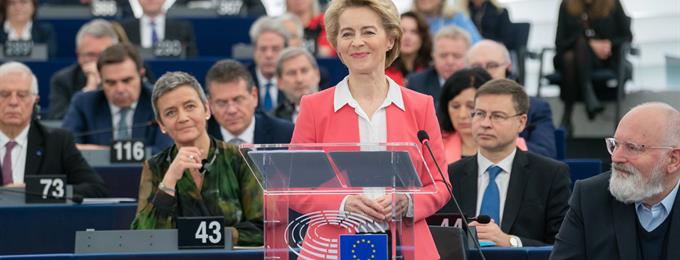During her presentation of the new Commission and their agenda in the European Parliament, von der Leyen focuses on how she wants to build a stronger Europe.
Suddenly it all went fast: During November, the incoming European Commission (EC) President Ursula von der Leyen’s three newly nominated Commissioners, replacing those previously rejected by the European Parliament, all had successful hearings. On 27 November, the European Parliament Plenary in Strasbourg confirmed von der Leyen’s College of Commissioners, which is now all set to take office on 1 December for five years. The new EC was approved by 461 votes to 157 against, with 89 abstentions. The new EC achieved a slightly better result than the Juncker Commission, and a similar one as both Barroso Commissions.
On the occasion of the presentation of her College of Commissioners and their programme, von der Leyen focused her speech in the European Parliament Plenary on how to strive for an innovation-driven, sustainable economy that would make Europe stronger. Her message juxtaposed her analysis that the European Union is currently not using its full potential to build a more modern, greener and inclusive economy to the fact that the continent has already a lot to offer: A wealth of knowledge, a large internal market and economic strength that could all be harnessed to build an even stronger Europe. She mentioned the performance of the EU’s industrial sector that is a leader in many high tech areas. For instance the EU produces a third of the world’s space satellites and, in fields that will matter even more in the future, such as renewable energy, European companies hold 40% of the world’s renewable technology patents. Von der Leyen emphasised the importance of research and innovation: “Europe has all the scientists and all the industrial capabilities it needs to be competitive in these areas. Let’s not talk ourselves down.”
However, this is not enough for the new President of the EC – and she got to the heart of the challenge: “We have to scale-up. For years, we have invested less in innovation than our competitors do. This is a huge handicap to our competitiveness and our ability to lead this transformation.” She underscored this with a convincing example: “Europe is currently in the process of acquiring one of the three most powerful computers on the world market. But the next generation of supercomputers must be built by us.” It is clear, the von der Leyen Commission wants to put education, research and innovation (ERI) centre stage: “… we must have mastery and ownership of key technologies in Europe. These include quantum computing, artificial intelligence, blockchain, and critical chip technologies.” This is where she sees the EU’s role: “To do this, to close the gaps that exist now, we must act together. Let us pool our resources, our money, our research capacity, our knowledge.”
Von der Leyen took the opportunity to focus on the means that will be necessary to so strengthen Europe’s position: “This is why we should not see the next Multiannual Financial Framework as a simple accounting exercise. The world seven years ago looks nothing like the world in seven years’ time. Our budget must be significantly modernised.” Apart from making the case – in the direction of the member states – for spending the EU’s money in future-oriented fields such as research and innovation, she also had an announcement to make: The portfolio of the (presently so-called) Commissioner for Innovation and Youth, Mariya Gabriel, will be renamed “Commissioner for Innovation, Research, Culture, Education and Youth”, emphasizing now all ERI domains.
This focus of the new EC on an innovation-driven approach echoes pronouncements earlier in November when the Eurogroup, the informal meeting of the finance ministers of the Eurozone, discussed the importance of investments in research and innovation in order to boost the EU’s economy. Furthermore, von der Leyen’s Commission received further backing for its other principal focus on fighting climate change and achieving carbon neutrality. Just a day after her confirmation, on 28 November, the European Parliament voted in favour of a resolution on declaring a climate and environmental emergency. The resolution was adopted with 429 votes for, 225 votes against and 19 abstentions and calls for more investments tackling climate change and gradual emission cuts of 55% by 2030 in order to achieve climate neutrality by 2050 – thus, backing von der Leyen’s agenda that calls for the same carbon emission reduction targets.
Picture: Commission©EU 2019 – EP

